Easy to Draw Baboon How to Draw a Baboon
Baboons are large and imposing animals that roam the countryside of Southern Africa. In this easy-to-follow tutorial. we are going to take you through all the steps to create a fantastic realistic baboon drawing. In just 16 simple steps, we will show you how to draw a baboon face, body, and limbs. Gather your drawing supplies and let us get down to our easy baboon drawing.
Table of Contents
- 1 Step-by-Step Tutorial for How to Draw a Baboon
- 1.1 Step 1: Outlining the Shape of the Baboon's Main Body
- 1.2 Step 2: Creating the Shape of the Head
- 1.3 Step 3: Shaping the Back of the Baboon's Body
- 1.4 Step 4: How to Draw a Baboon Face
- 1.5 Step 5: Drawing the Top of the Baboon's Neck
- 1.6 Step 6: Outlining the Front Legs
- 1.7 Step 7: Drawing the Baboon's Tail
- 1.8 Step 8: Shaping the Rear Legs
- 1.9 Step 9: Creating the Final Outline of Your Baboon Drawing
- 1.10 Step 10: Adding Fur Texture
- 1.11 Step 11: Laying Down the First Color Coat
- 1.12 Step 12: Creating Contours with Color
- 1.13 Step 13: Adding Shading
- 1.14 Step 14: Adding the Second Color Coat
- 1.15 Step 15: The Final Shading Step
- 1.16 Step 16: Erasing the Final Outline and Finalizing
- 2 Video Tutorial on How to Draw a Baboon
- 3 Frequently Asked Questions
- 3.1 Will the Tutorial Help You Learn How to Draw a Baboon Face?
- 3.2 Is It Difficult to Create a Realistic Baboon Drawing?
Step-by-Step Tutorial for How to Draw a Baboon
The shape of baboons is unique and can be a little intimidating when you first start learning how to draw a baboon. To make the shaping and proportions a little easier, we begin our baboon drawing tutorial using some construction steps. You can see the outline of our realistic baboon drawing tutorial in the collage below.

When it comes to choosing the correct artistic medium for your baboon drawing, the choice is really down to you. Whether you are an acrylic artist, or you prefer to use colored pencils or gauche paint, you can easily adapt the coloring steps to suit your needs.
With that being said, find a comfortable place to work, and let us begin learning how to draw a baboon.
Step 1: Outlining the Shape of the Baboon's Main Body
We always begin our drawing construction by creating the basic shape of the largest part of the animal's body. In this case, the main torso shape is the largest part of the baboon's body, so we will begin with this. The body is not particularly long, but it is quite round. As such, you can use a large slightly oval shape to represent the main body of the baboon drawing.
Using a light pencil, draw this main body shape in the center of your canvas, leaving plenty of space on all sides for the rest of the baboon's body.
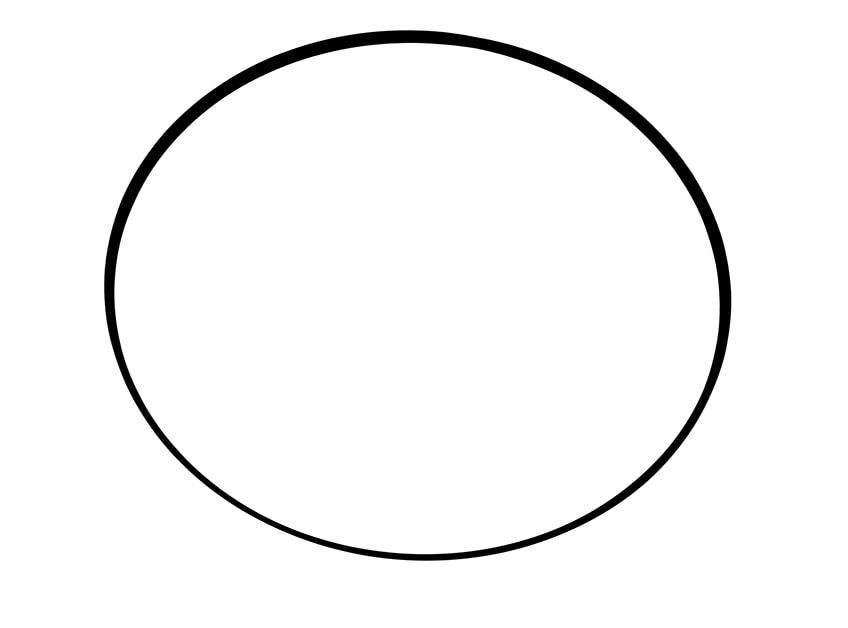
Step 2: Creating the Shape of the Head
Compared to the main body shape, the head of your baboon drawing is significantly smaller. You are going to use a slightly off-circle shape to represent the head of the baboon.
You want this head shape to be just above the top of the main body shape, and it should overlap with the main body a little on the right side.
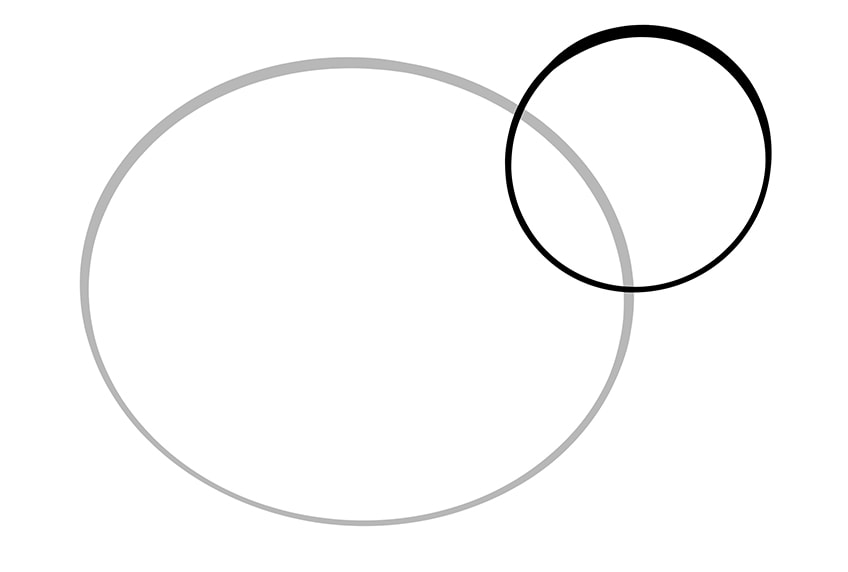
Step 3: Shaping the Back of the Baboon's Body
If you have ever seen a baboon in real life, you will know that one of their most characteristic features is their slightly garish behind. In this step, we are going to outline the shape of this back end to help us in future steps. For this back part of your baboon drawing, use a circle that is slightly larger than the head shape.
You want to place this circle overlapping with the left point of the main body shape.
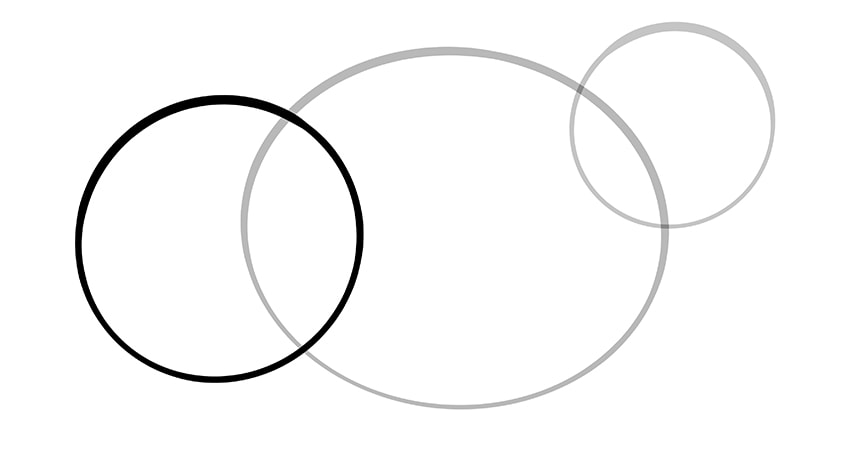
Step 4: How to Draw a Baboon Face
Alongside their interesting behinds, baboons are most known for their unique facial features. On the head circle, you can now draw a long curving snout that extends out beyond the bottom of the head. This snout should be wider at the bottom, and you can draw a mouth line at the bottom.
Finish this step by drawing the eye area at the top of the snout.

Step 5: Drawing the Top of the Baboon's Neck
Baboons tend to have a bit of a hump on the top of their necks, and that is what we are going to draw in this step. Using a single line, you are going to connect the head and body shape of your baboon drawing.
This line should begin on the top of the head and curve upwards before joining the main body just behind the midline.
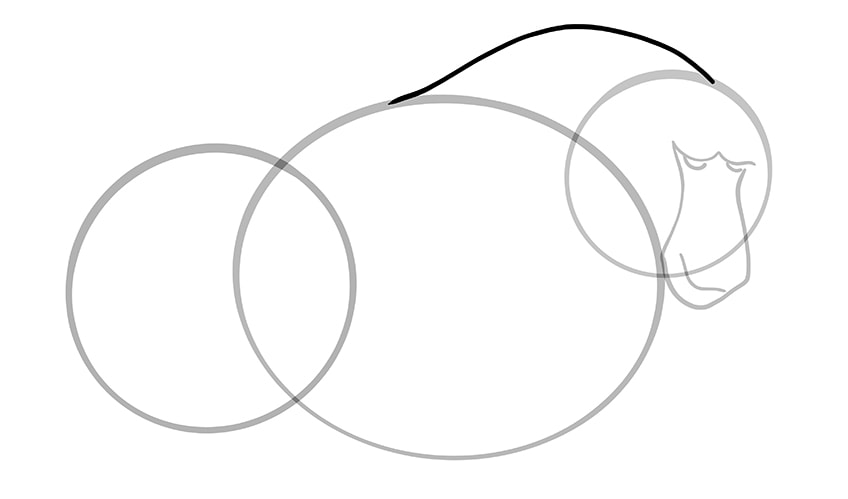
Step 6: Outlining the Front Legs
Your baboon drawing is in motion, and to capture this correctly, we need to draw the front legs as though they are moving. Begin with the leg that is closest to our perspective and extends straight down to the floor from the bottom of the main body. At the bottom of this first leg, draw a little toe that extends forwards. The second front leg is behind the body of your baboon drawing, so the back top part will be slightly obscured by the leg in front of it.
Draw this leg at an angled position extending forwards until it is in line with the front of the head circle. Finish this leg with three toe separations on the end.
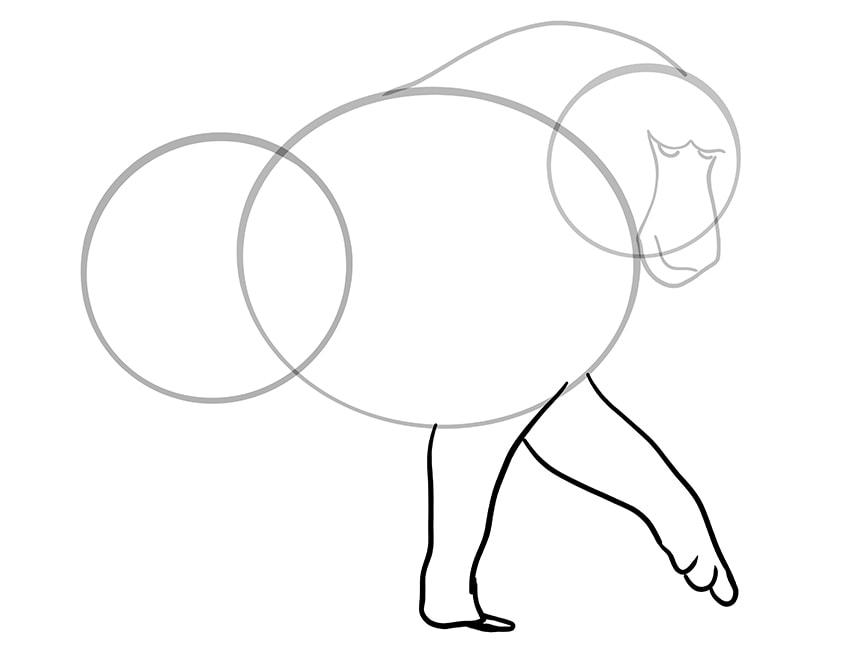
Step 7: Drawing the Baboon's Tail
Before moving onto the back legs, you are going to draw the tail of the baboon. Start the tail line on the top of the main body shape, taking the line back onto the behind circle. You can then take this line up, around, and down.
Finish the tail by taking the line back up and joining it to the rear circle.
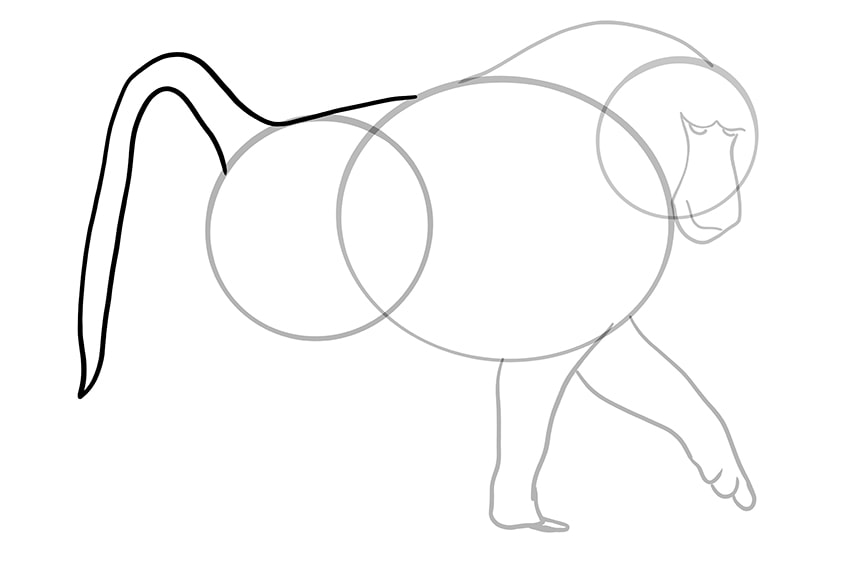
Step 8: Shaping the Rear Legs
For this final construction step, you are going to draw the shape of the back legs. Begin with the leg that is furthest from our perspective. Start the back line of the leg just below the tail line, and curve it out and down to join the floor. Add two toe shapes, and then take this line back up towards the rear circle, but do not join it. Repeat this process for the second leg, but begin the back line on the rear of the back body circle.
Curve this line forwards and down, and finish this leg with three toe separations.
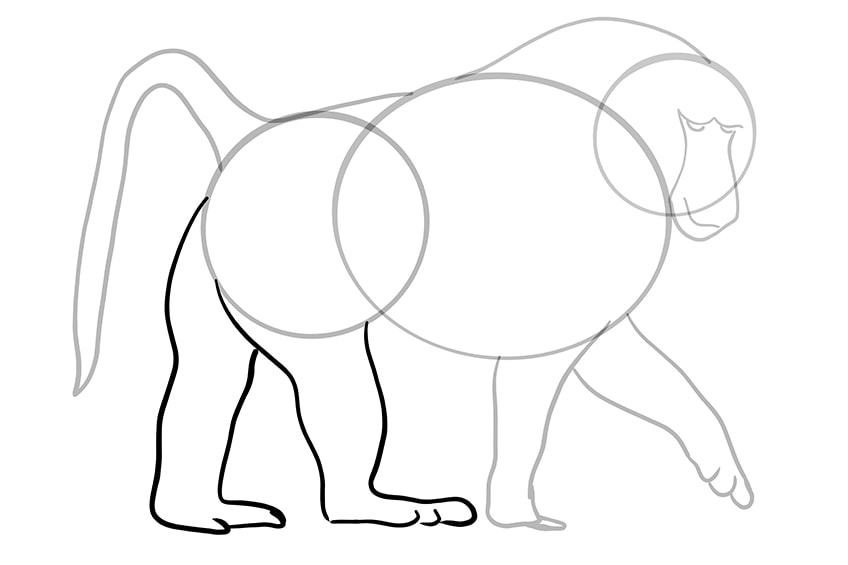
Step 9: Creating the Final Outline of Your Baboon Drawing
In this step, you are going to use all of the construction lines you have drawn so far, to help you create the final outline of your realistic baboon drawing. Begin with the head and face, outlining the facial features, including the eyes, nose, mouth, and adding a little nostril shape. Outline the head circle with short lines to create a furry outline.
Follow the rest of the construction lines using these short lines.
On the lower parts of the body, including the chest, belly, and legs, use slightly longer fur lines. Add a little hairy circle just below the tail, and just in front of the front-back leg. Finish this step by creating the final outlines of the toes on each foot. You can now erase any of the remaining construction lines that are visible.
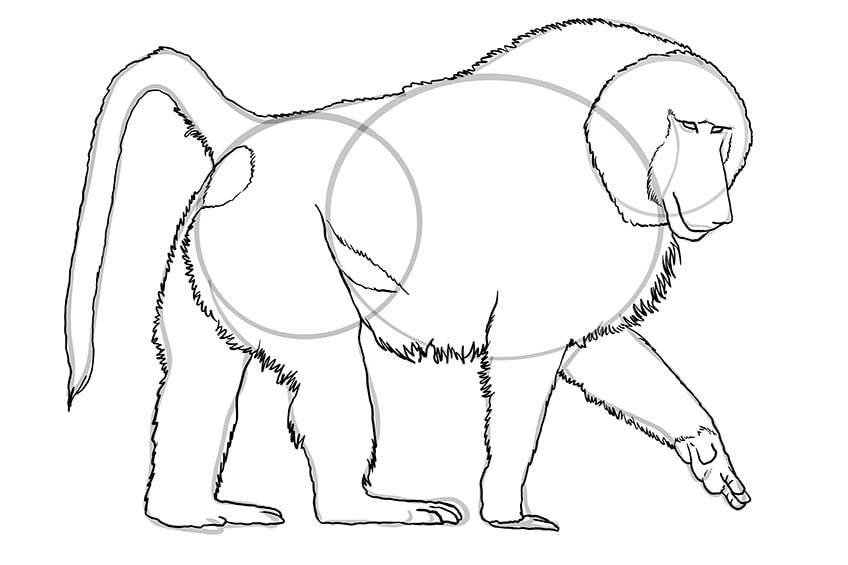
Step 10: Adding Fur Texture
In this step, you are going to add some textural detail to the face and body of your baboon drawing. Begin at the face, adding some short curved lines to the face to create depth and dimension. Around the snout, you can begin to draw short hairlines radiating out towards the edge of the face.
Continue to follow the shape of the baboon's body with these short hairlines. As you move further down the body, these textural lines can gradually become longer.
Fill the entire body of your baboon drawing with these texture lines, except the paws, muzzle, face, and the hairless patches you outlined in the last step.
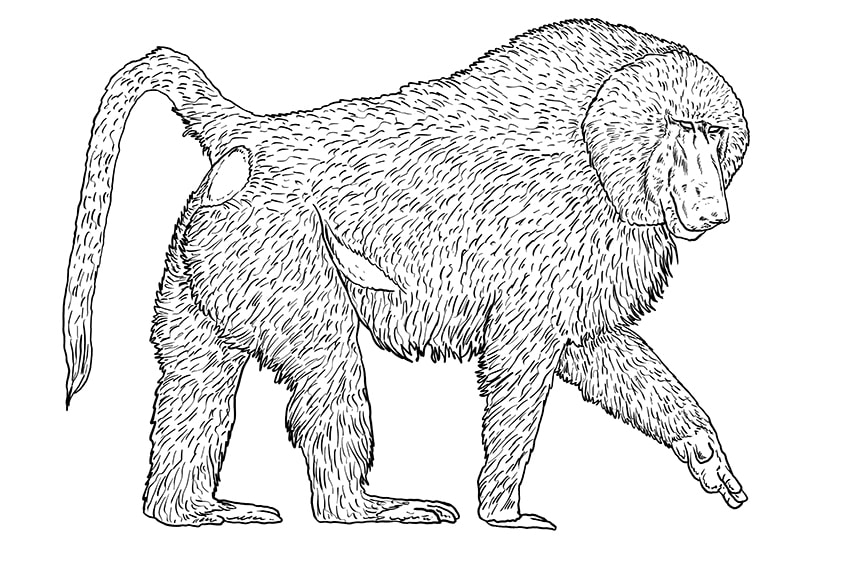
Step 11: Laying Down the First Color Coat
In this step, you are going to begin the coloring of your baboon drawing. To build up realistic coloring, we tend to work in steps, beginning with the base shade.
For the base coat, pick a tan brown shade and use this to fill the entire body of your baboon drawing.
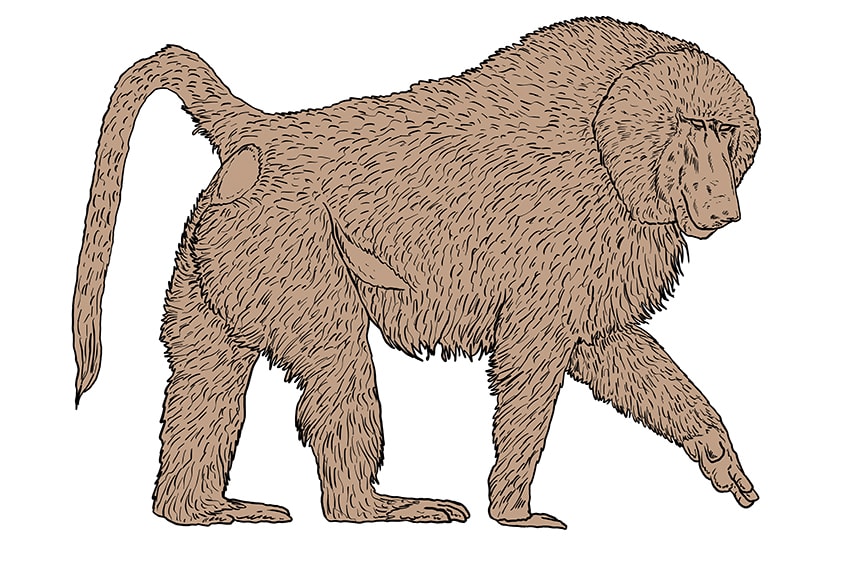
Step 12: Creating Contours with Color
Contouring is one of the best methods for adding realistic definition and shape. In this step, you are going to use a touch of black paint and a very soft blending brush to add contouring to areas that need a more defined structure. Focus your contouring on the upper areas and around the sides of the face, down the center of the chest, on the belly, feet, and on the tail.
If you want a lighter blend, a good tip is to add a touch of black paint, and then use a dry blending brush to blend it out.
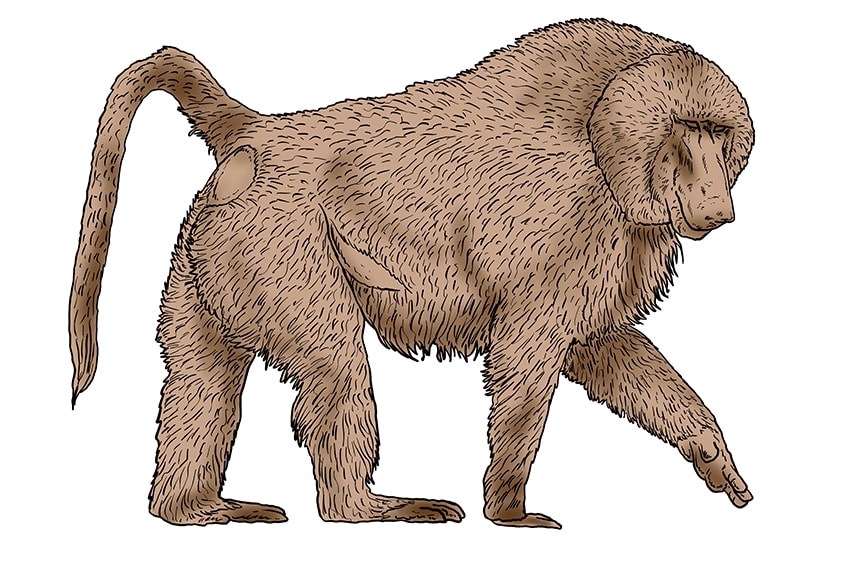
Step 13: Adding Shading
Now, you are going to use a little more black paint to add more shading to the contour areas from the last step. Leave the edges of the contours peaking out a little, making the center a little darker.

Step 14: Adding the Second Color Coat
Now that we have the base color and basic shading down, we are going to add a second color coat. Use a second layer of tan brown paint, and fill the entire body of your baboon drawing with this shade. Now we are going to move on to how to draw a baboon face with color. For the second part of this step, find a small blending brush and use a touch of black paint to gently contour the shadows around the eye area, the nostrils, mouth line, and the textured facial lines that you added earlier. Next, add some dark brown paint to lightly add facial color to the face, and bottom patch, and feet.
Finish this step by using a touch of white paint to add a shimmer in each eye.

Step 15: The Final Shading Step
In this final shading step, you are going to use a blending brush and a touch of black paint to emphasize the shading from the earlier steps.
These areas include the facial structure, body structure, and feet.
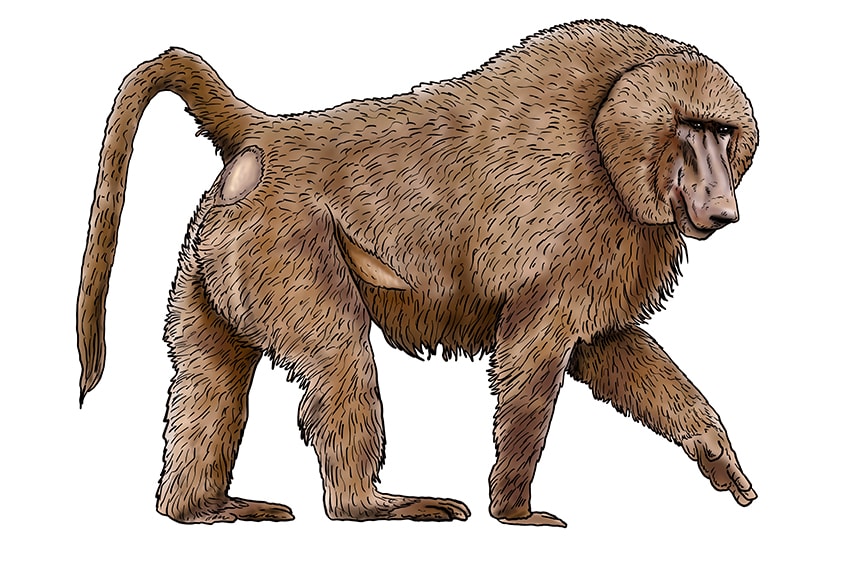
Step 16: Erasing the Final Outline and Finalizing
To finish this baboon drawing, you are going to do two things. First, you are going to erase the outlines within your drawing, and then you are going to add some fur strokes. Begin by using the corresponding color at each point of the outline to trace over it.
Finally, use a fine brush to add fur strokes between the existing strokes to create a fuller and more nourished coat.
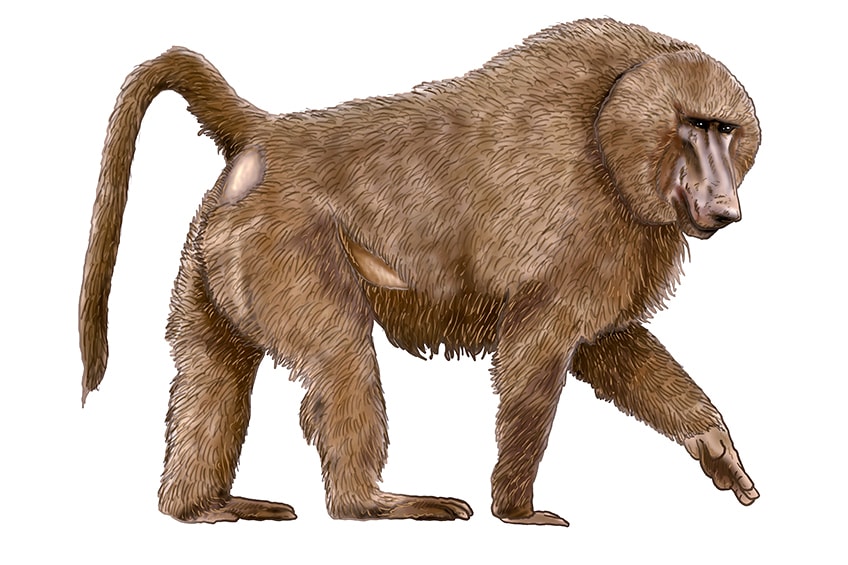
Just like that, you have created a beautiful and realistic baboon drawing in only 16 simple steps. We hope that you have enjoyed the tutorial and that you are happy with your final drawing! Hopefully, we will see you soon for another animal drawing tutorial.
Video Tutorial on How to Draw a Baboon
Frequently Asked Questions
Will the Tutorial Help You Learn How to Draw a Baboon Face?
Absolutely. One of the hardest parts of drawing a baboon is drawing the face. In our tutorial, we show you exactly how to draw a baboon face in easy steps, so that you can nail it the first time.
Is It Difficult to Create a Realistic Baboon Drawing?
When you first approach drawing a baboon, it may seem intimidating. Our baboon drawing tutorial makes creating a realistic drawing very simple and quick!
Source: https://artincontext.org/how-to-draw-a-baboon/
0 Response to "Easy to Draw Baboon How to Draw a Baboon"
Postar um comentário